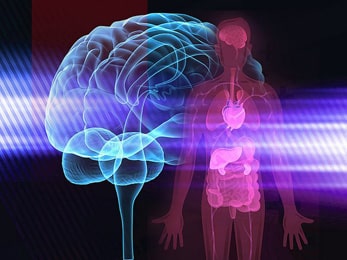How does Ayurveda view the Mind-Body Connection?

According to Ayurveda, the mind has an extremely powerful influence on our overall health and wellbeing. Even very minor disturbances in our mental wellbeing can have the potential to negatively affect not just the quality of our life situation, but also our physical health. In more extreme cases it can lead to a whole range of diseases – for example, unresolved anger can accumulate in the liver and impair its functioning; unprocessed grief can upset the function of the lungs and chronic anxiety can disturb colon health.
This view is of particular interest to me, because back home in the UK we are in the midst of a mental health epidemic and funding cuts to services mean that we are seeing more and more people detrimentally affected by mental health disorders, unable to thrive at work and at school and often unable to attend at all. I am currently working closely with a charity who provides vital education and wellbeing services to children and their families affected by SEMH (social, emotional and mental health) issues. These families have nowhere else to turn because the local authority and health services are unable to meet their needs.
Western science has many limitations, but once one has a basic understanding of Ayurveda, it becomes clear just how vast the difference is between their approach to mental health in the east, compared to in the west. Ayurveda is a holistic therapy and offers an alternative approach to healing mental health, presenting a multifaceted approach to achieve perfectly balanced health or Swasta. Unlike western medicine, it sees each individual as a unique constitution of mind, body and spirit. The nature of the patient, the nature of the disease and the nature of the medicine must be understood and addressed before any treatment is given. The Ayurvedic practitioner will identify and attempt to remove the root cause of an illness, something very rare in the west.
Another key difference is the location of the mind. According to Ayurveda, the Mano Vayu Sotra, or mind system, is rooted not only in the brain but also in the heart, so a key aspect for any mentally unwell patient is to get out of their heads and step into their hearts.
Ayurveda facilitates self-examination and self-realisation – it warns us against attachment; it reminds us that all suffering comes from our thoughts; it encourages us to not get caught up in our thoughts and to strive to be Sattvic, or have peace of mind, whilst remaining in the present moment as much as we can. Mental harmony and wellbeing can only manifest once we clear the mind of its stream of thoughts (chitta) and connect with our higher selves.
One of the many things I have learned during this course is that many of my clients through work (who may be suffering from social anxiety, ADHD, bipolar etc) are given toxic medications in the west to “treat” these conditions. These powerful drugs create Ama, or toxins, and have many problematic side effects. Generally, there is no attempt to discover a root cause as the symptom is viewed in isolation, so, for example, a high vata patient is likely to be given a diagnosis which they would carry around for life, when in fact their mental disorder is a symptom of a far more complex imbalance in the system that could be treated and cured in a reasonably short space of time. The drugs they are prescribed may suppress the overactivity in the mind, but it won’t correct the doshic imbalance, the root cause. Worse, once caught in this drug based system and with a mental health label, it is very hard to get out.
The pathway of mano vayu sotra is the entire body – the mind quite literally affects, and is affected, by every cell and tissue throughout the body, meaning that there is a direct relationship between the mind and our overall health and vitality. Conversely, our physical health also affects our state of mind. Every experience that we have has the potential to support or disturb our general state of balance in both the mind and the body.
I will be returning home looking at mental health issues through a whole new and expanded lens. This new knowledge gives me a lot of hope because ultimately we can positively impact every cell, tissue and pathway in our bodies through our diet, our environment, our actions, our practices (yoga, meditation, pranayama) and most importantly through our thoughts, attitudes and emotions. More recently, following positive results from numerous evidence based studies, our National Health Service has expanded its offering to some mental health patients to include mindfulness and cognitive behavioural therapy. Perhaps at some stage in the future we will see a slow and gradual introduction of ayurvedic principles into the treatment of mental health disorders in the UK, bridging the gap between east and west and successfully tackling our mental health crisis.
Sarah Buchanan – Bristol, United Kingdom



